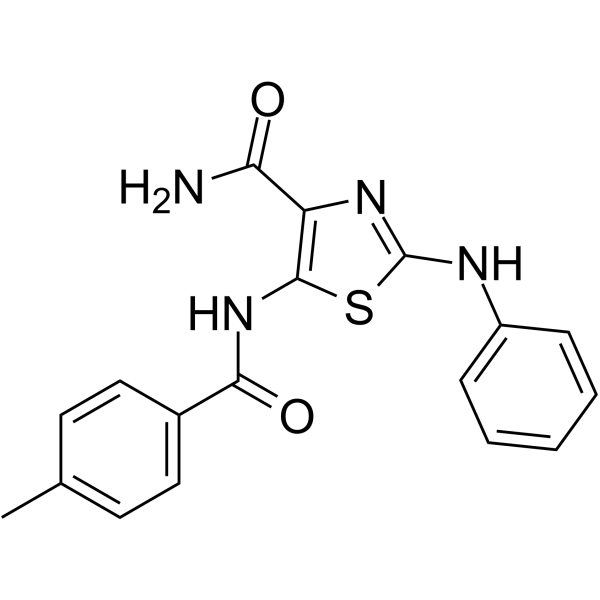
KY-05009
CAS No. 1228280-29-2
KY-05009( —— )
Catalog No. M26273 CAS No. 1228280-29-2
KY-05009 pharmacologically inhibits TGF-β1-induced epithelial-to-mesenchymal transition (EMT) in human lung adenocarcinoma cells.
Purity : >98% (HPLC)
 COA
COA
 Datasheet
Datasheet
 HNMR
HNMR
 HPLC
HPLC
 MSDS
MSDS
 Handing Instructions
Handing Instructions
| Size | Price / USD | Stock | Quantity |
| 2MG | 40 | In Stock |


|
| 5MG | 65 | In Stock |


|
| 10MG | 111 | In Stock |


|
| 25MG | 267 | In Stock |


|
| 50MG | 389 | In Stock |


|
| 100MG | 560 | In Stock |


|
| 500MG | 1152 | In Stock |


|
| 1G | Get Quote | In Stock |


|
Biological Information
-
Product NameKY-05009
-
NoteResearch use only, not for human use.
-
Brief DescriptionKY-05009 pharmacologically inhibits TGF-β1-induced epithelial-to-mesenchymal transition (EMT) in human lung adenocarcinoma cells.
-
DescriptionKY-05009 pharmacologically inhibits TGF-β1-induced epithelial-to-mesenchymal transition (EMT) in human lung adenocarcinoma cells. KY-05009 inhibits the protein expression of TNIK and transcriptional activity of Wnt target genes and induces apoptosis in cancer cells. KY-05009 exerts anti-cancer activity.?KY-05009 is an ATP-competitive Traf2- and Nck-interacting kinase (TNIK) inhibitor (Ki = 100 nM).?(In Vitro):KY-05009 (1-3 μM; 48-72 hours; RPMI8226 cells) treatment induces caspase-dependent apoptosis in RPMI8226 cells in a dose-dependent manner. KY-05009 (3 μM; 1 hour; RPMI8226 cells) treatment suppresses the transcriptional activity of Wnt signaling-related genes, including TNIK, CTNNB1, TCF7, and TCF4. KY-05009 (3 μM; 9 hours; RPMI8226 cells) treatment inhibits the IL-6-induced interaction between TCF4 and β-catenin and the phosphorylation of TCF4.KY-05009 (0.1-30 μM;?24 hours;?RPMI8226 cells) treatment inhibits the proliferation of RPMI8226 cells in a dose-dependent manner.
-
In VitroCell Proliferation Assay Cell Line:RPMI8226 cells Concentration:0.1 μM, 0.3 μM, 1 μM, 3 μM, 10 μM, 30 μM Incubation Time:24 hours Result:Inhibited the proliferation of RPMI8226 cells.Apoptosis Analysis Cell Line:RPMI8226 cells Concentration:1 μM, 3 μM, 10 μM Incubation Time:48 hours, 72 hours Result:Induced the binding of fluorescent Annexin V and 7-amino-actinomycin D (7-AAD) uptake.RT-PCR Cell Line:RPMI8226 cells Concentration:3 μM Incubation Time:1 hour Result:Suppressed the transcriptional activity of Wnt signaling-related genes, including TNIK, CTNNB1, TCF7, and TCF4.Western Blot Analysis Cell Line:RPMI8226 cells Concentration:3 μM Incubation Time:9 hours Result:The IL-6-induced interaction between TCF4 and β-catenin and the phosphorylation of TCF4 were inhibited.
-
In Vivo——
-
Synonyms——
-
PathwayWnt/Notch/Hedgehog
-
TargetWnt/beta/catenin
-
Recptor——
-
Research Area——
-
Indication——
Chemical Information
-
CAS Number1228280-29-2
-
Formula Weight352.41
-
Molecular FormulaC18H16N4O2S
-
Purity>98% (HPLC)
-
SolubilityIn Vitro:?DMSO : 83.33 mg/mL (236.46 mM)
-
SMILESCc1ccc(cc1)C(=O)Nc1sc(Nc2ccccc2)nc1C(N)=O
-
Chemical Name——
Shipping & Storage Information
-
Storage(-20℃)
-
ShippingWith Ice Pack
-
Stability≥ 2 years
Reference



-
BML-284 HCL
BML-284 HCL is a potent, selective Wnt canonical signaling activator and tubulin polymerization inhibitor.BML-284 HCL does not inhibit the activity of GSK-3β, and may be a useful tool in the study of physiological processes that involve the Wnt pathway.
-
Vantictumab
Vantictumab (OMP-18R5) is a humanized anti-FZD1/2/5/7/8 monoclonal antibody that inhibits Wnt pathway signaling and is used in research studies for the treatment of metastatic HER2-negative breast cancer and metastatic pancreatic adenocarcinoma.
-
Delafloxacin
Delafloxacin (RX-3341, ABT-492) is a fluoroquinolone antibiotic agent. It has potent inhibitory against levofloxacin-resistant Streptococcus pneumoniae strains (MIC: 0.0078-0.125 μg/ml).



 Cart
Cart
 sales@molnova.com
sales@molnova.com


